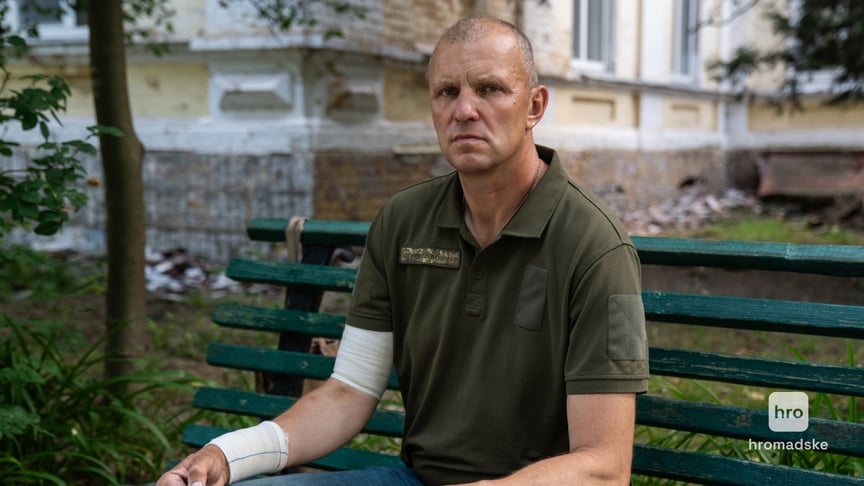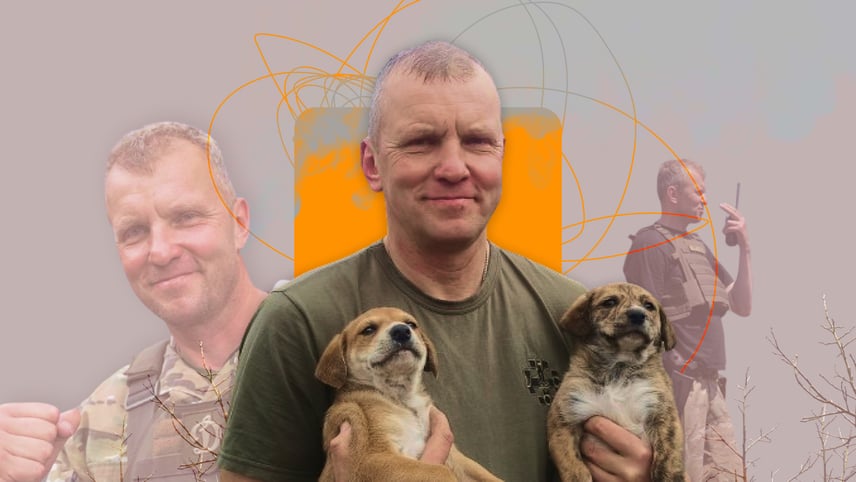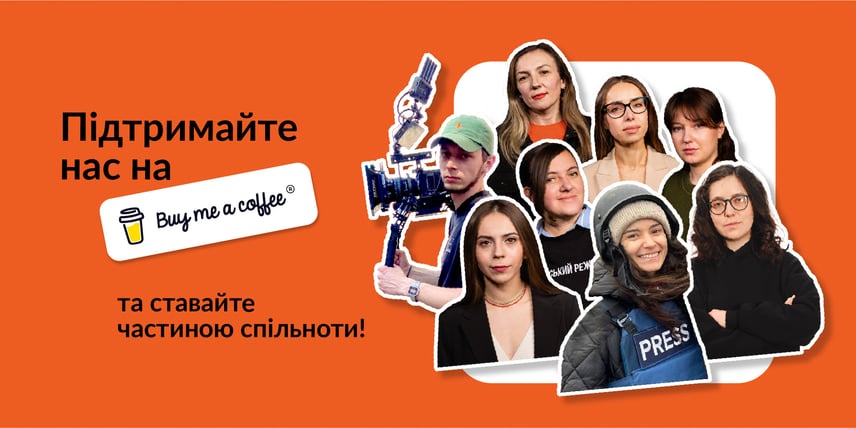“I will calm down when Russia collapses”. Topolia on his wars for Georgia, Chechnya and Ukraine

Ihor Mazur, 51, walks among the poplar trees on a Kyiv street. He is a legendary military officer, political activist, and lawyer.
He is thin, wiry, and light-skinned. Over two meters tall. He is like a poplar tree. He has a call sign like that.
We meet near the hospital in Kyiv, where he is being treated after being wounded. Pieces of thread are sticking out of his temple, and he has two bandages on his right arm. Between them, the wounds from the shrapnel he scratches are healing. He says it’s itchy like in childhood.
Relaxing music is coming from the hospital. A lot of The Beatles. A siren interrupts the phrases from the loudspeaker in support of the military – “Ukrainians are proud of you”, “Honor to the heroes”. And it is so loud that the words are indistinguishable. Ihor smiles and sits down closer.
We talk about why he fought in Abkhazia in the 90s, how Georgiy Gongadze filmed him in his movie, how Dzhokhar Dudayev pushed back on his shoulders, and why Shamil Basayev was angry with him.
We talked about the current war for a long time, but I will write about only one day of it. The day when Ihor Mazur was wounded.
Georgia
The last time we spoke was a few days before the full-scale invasion. And when you mentioned that you had been with Georgiy Gongadze in the war in Abkhazia in 1992-1993, I thought that I should write about it. You also said then that Ukrainians fought for Georgia to keep the Russians out of Ukraine. I think it's time to remember that.
I have always wanted justice. I studied history, but when I was 19, I left the institute and went to Transnistria. The war was raging there. As a UNSO member, I wanted to return my mother's lands — the border villages that had been ours until 1940.
I shot a little bit. I can't say that a lot, but I felt the atmosphere of war. I was guarding one of the deputies who was in favor of the return of Ukrainian lands. In Tiraspol, there was a public organization called “Chervona Kalyna”, and there were three churches of the Kyiv Patriarchate in Transnistria. We were an alternative to Russia, but, unfortunately, the Kremlin's followers won.
In 1993, the UNA-UNSO leadership decided to help the Georgians in the war with Russia over the territory of Abkhazia. the Russians wanted to create a controlled hotspot there, take control of the ports and dominate the Black Sea. The Russian fleet shelled Sukhumi.
I went there together with the Argo unit of the UNA-UNSO. We realized that this assistance was in the interests of Ukrainians. As long as the Russians are fighting on someone else's land, they will not come to Ukraine.
We were flying unofficially, like a walk around Georgia: in jeans, with some sports bags. We didn't look too touristy: we were a distinct type of guys who had been through combat training.
We were greeted like movie stars: with a red carpet to the gangway. Generals and deputies. There was confusion: they thought we were some kind of elite troops. Russian television also reported that a battalion of marines from Ukraine had arrived. This would have been 500 people, and we were 30. The Kremlin then deliberately demonized the UNA-UNSO members, as it does now with the Azov fighters.
The Georgians treated us to wine and cognac at the gate, but we had to fly on to Sukhumi. The most difficult battles there were for the village of Shroma, which changed hands for six months.
It was there that I first closed the eyes of two of my friends and lost a third comrade: a piece of shrapnel hit him while unloading, and the ammunition detonated. I have never heard a person scream like that in my life. Neither before nor after. He died in three days.
By the way, my friend Mykola Karpiuk, a future political prisoner of the Kremlin, was wounded in that battle.
Giya Gongadze came to our base when he learned that there were Ukrainians here. We had just had three days of rest after the Shroma. He said: “I'm going to make a documentary”. And he started filming Shadows of War. Then we traveled with him in the mountains, he was with a cameraman.
“I made it as a sign of gratitude to those people who shed their blood for the freedom and independence of my country,” Georgiy Gongadze said about his film.
In the film, 20-year-old Topolia reflects: “Today they are there, tomorrow they will be in Ukraine.” “Our enemy is Moscow, we don't hide it. We found the documents of the killed. We did not even see Abkhazians on the other side.” “The hardest thing is to carry the corpse of a comrade.” “War is cool. It's better to die like this than to see evil and not oppose it, to wait until it strangles you.”
For fighting in Abkhazia, Ukrainians who distinguished themselves were awarded the Vakhtang Gorgasali Order. Seven of the dead were awarded posthumously. And when the UNA-UNSO members returned home, the Security Service of Ukraine opened criminal cases against them for participating in illegal armed groups.
Topolia explains: “Russian President Boris Yeltsin shouted at Kravchuk: ‘What are your troops doing in Georgia? The security guards recalled that he even hit him in the face with a sauce pan. We received an order from the UNSO leadership to leave Georgia. They opened a case against us, but closed it quickly enough — they had no witnesses.”
Chechnya
In 1994, during the First Chechen War, you were part of a group protecting foreign journalists. You communicated with Chechen President Dzhokhar Dudayev, who advocated Chechnya's independence and was later killed by Russia for doing so. What do you remember about him and Basayev?
I and Liman — this was the call sign of a guy from Cherkasy — guarded one of Dudayev's Staff meetings. We, the UNA-UNSO members, were his guard.
It was night. We, two-meter tall, strong guys, were ordered to guard one of the doors. And here he comes out with his retinue. He saw us and started talking: “Ukrainians are our brothers. We will defeat Moscow together!” He stands between us, puts his hands on our shoulders and jumps up. We were like bars for him. The Chechens behind us were so stunned: “Wow, what a commander we have”.
I had a conversation with Brigadier General Shamil Basayev. The year before, he had been the head of a Chechen unit in Abkhazia, fighting against the Georgians. Actually, at the time, he was fighting for the freedom of the Abkhaz people. Later he realized that this war was beneficial to the Muscovites, and in the First Chechen War he fought against Russia.
Sometimes we, UNA-UNSO members, came to his guys' headquarters to talk about how we would organize parades on Red Square. We shared a common hatred of the enemy. And somehow Basayev saw my UNSO ID card, which had two seals on it — Transnistrian and Georgian. They gave permission to carry weapons.
He called me over. He was gloomy.
— We fought on different sides. So are we enemies? — he asked.
— We are fighting against a common enemy, — I corrected.
— So should I stamp it with my seal with a wolf too?
— I guess. After all, I am for Chechnya against Moscow.
That's how I got my third seal — with a wolf. I was unable to preserve this historical ID. In 1995, we were leaving Chechnya through Russia. And although I hid it behind a Nietzsche binding, my commander Sashko Bilyi burned it, because if the Muscovites found it, they would immediately kill me or send me to a concentration camp. I still have the philosopher's volume. It's tattered, but I carry it with me all the time.

Ukraine
I know that you have been fighting since 2014, you have many merits and awards. I know that you volunteered on February 24 two years ago. You have a lot of experience, but tell us about the latest: how were you wounded?
It was near Nevske in the Luhansk region. My last position was a platoon commander. So, I needed to be with the guys.
We were defending the position. It was, so to speak, the vanguard position, the road to the main positions. And the enemy recaptured the positions in front of it in early May.
A few days before my group arrived, the Russians captured the position and took five guys prisoner. At another position, our gyus fought a battle and killed two Katsaps. One of them had a radio left, and our guys heard the group commander asking a higher commander: “We have captured five Ukrainians, what should we do with them?” – “Are there any officers among them?” – “No.” – “Eliminate them.” The guys were shot.
It was May 31. We are at the position, and it wa not fully developed, because sometimes the guys do not have time, and the enemy does not allow it. Some branches were thrown in, some bags of earth, so it was very poorly protected. A hundred meters away was our other position, taken by the enemy. The one where our guys were shot.
And they are shooting at us with everything they have. They smashed dugouts and ceilings. Those of us who were there were a little bit shell-shocked, so we moved to a slightly larger dugout. I was there too, there were seven of us. As soon as we tried to climb out to rebuild those filled up, collapsed trenches, the “bird” immediately adjusts their fire. We are being targeted by AGS, grenades are coming from nearby. And at three in the morning, in the dead of night, the Russians attacked.
A battle broke out in this forest. Not a super scary one, but it was the first for two of my guys. There are five of us on the front, and two of us in the dugout, one of them responsible for the radio. If something happens, they have to shout to us, for example: “We are surrounded!”
The battle was like many other. We used ammunition from the six magazines we had pretty quickly. We had some more hidden there, and I shouted to one guy: “Dig the magazines and boxes of grenades up and bring them here”. He started throwing F-1 grenades in the direction of the enemy. At the same time, the grenade launcher was firing. And the machine gunner was using a PKM, his bullets were armor-piercing, that is, they could pierce body armor. Russians do not like to attack when heavy machine guns are working.
While I was throwing grenades, a “bird” flew in from the side with a load of eggs, as we say, because it was carrying two grenades or two rounds. It throws one, then takes a little aim and throws the second one after 30 seconds. It didn't hit me, and at that time I saw a guy who dug up a grenade launcher. I said: “Shoot there.” – “No, I'm not ready.” – “Okay, give it to me.”
And then I, two meters tall, got up to shoot, because the grenade launchers only shoot standing up. And on the other side, two or three Russians were looking for a target. As a rule, the grenade launcher and machine gunner are the first to be hit. These are, by and large, semi-suicidal.
I fired five shots with an RPG-7, and on the sixth I heard a characteristic sound in the air when the “bird” releases its load. I heard a cotter going off. You hear this sound at least ten times a day, so you don't get scared.
The drop occurs at an altitude of about a hundred meters. Maybe it will fall 5 meters away from you, maybe a meter away. But you keep shooting. You think: maybe this “gift” is not for me. But it turned out to be for me.
A second and a half later, there was a bang next to me: it felt like my head had been blown off. Then I realized that my eyes and mouth were full of earth. At the same time, blood was pouring out of my head and my arm, leg, back — the whole right side — hurt.
I thought that was it. But I crawled into the dugout by feel: “Who is there? Wash my eyes and bandage my head.” I saw four guys sitting there: “What are you doing here?” – “The positions are destroyed.” — “Yes, they are, but three of them are fighting somehow! Shoot in that direction at least somehow. Find a place. The main thing is for them to realize that there are many of us here.”
When I was leaving there for reinforcements, I told the guys: “Fight, because they will not take you prisoner, they will shoot you. If they storm hard, retreat. If you find me on the road, drag me away.”
To get to the forest plantation, where our positions are, we have to cross 200 meters of open field. The Russians know this and constantly shell this piece. I hobbled to this field and realized that this was my “run of the century”. They shot at me with an AGS, but missed.
I ran into that forest plantation and found our positions. I had to walk another 1.5 kilometers to the medevac, I couldn't get any closer to avoid being discovered. A machine gunner caught up with me — the one who was with me on the battlefield. He was also wounded.
We walked to the evacuation vehicle, drove 12 kilometers on these twitchy roads. I thought to myself: if I was seriously wounded, the chances of getting there were slim. The medics treated and bandaged me up. In Lyman, they sewed up my head, but they said there was no point in sewing up my arms, because there was mud there. I had to wait until the wound stabilizes. They sewed me up in a week.
What about the position you were defending?
A day later they knocked us out. Three guys were killed, six were wounded. Then they gave the command to retake the position. The guys went, and the deputy political officer went with them, although he was not supposed to go. He decided to support his comrades. He had only recently been mobilized, he only graduated from the military department, with no experience at all.
He was killed... He is still lying in the middle of this field through which I ran. And not far away, on the other side, there are three Russians who tried to run into this forest plantation. Our guys jumped out to take ours, but no one cared about them.
You've been fighting since you were 19. Four wars, an activist of both Maidans, imprisoned for the “Ukraine without Kuchma” campaign. How does it feel to be in this regime for 30 years?
I am used to it. I feel that the struggle is not over yet. Old cars manufactured in the late 90s or early 2000s had a warranty period. The engine was supposed to run 500 thousand kilometers. My engine can still go 150 thousand kilometers.
I will calm down the moment something happens: let's say Russia collapses. Then I will think about my memoirs and spend time my grandchildren. I hope I will have them by then.
Who was the first to call you Topolia?
There were several groups of us who entered Georgia. In one, the soldiers were given nicknames related to the weather: Rain, Clear, Puddle.
We had names for trees and bushes: Kalyna, Shypshyna, Dubetskyi... I was the tallest. What is the tallest tree? It was somehow offensive to be a baobab. I became Topolia (poplar in Ukrainian – ed.).
- Share:

